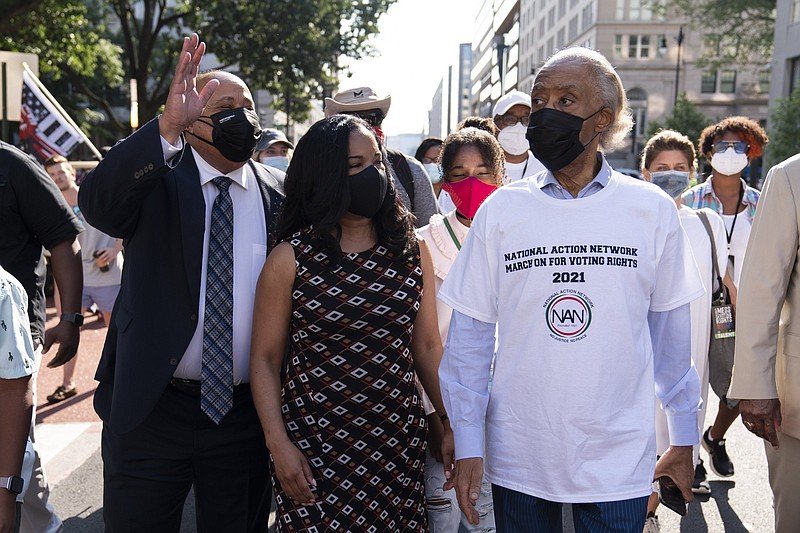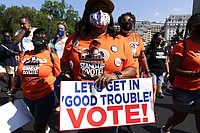WASHINGTON -- Thousands of people marched Saturday to mark the 58th anniversary of the historic March on Washington and voice their support for expanding and protecting access to the ballot.
The crowd cheered, sang and danced in the streets on the way to the National Mall while calling on Congress to pass an extensive voting-rights measure and eliminate the filibuster if necessary to do so. The marchers, though fewer than in years past, also demanded District of Columbia statehood and an end to police brutality.
[Gallery not loading above? Click here for more photos » arkansasonline.com/829votemarch/]
"If we keep going down this road, we're going to be back like Jim Crow," said Craig Browne, 74, who traveled to the nation's capital from Wyncote, Pa.
Browne, who lived in Alabama when segregation was still in place, said he had wanted to join the Rev. Martin Luther King Jr., John Lewis and other civil-rights leaders in the historic 1963 march, but his mother didn't want him to miss school. As he joined others in McPherson Square, he wore a shirt with the face of Lewis, who went on to become a Democratic congressman from Georgia, and carried a sign with a quote of his that read, "The vote is the most powerful non-violent tool we have." Others held signs invoking Lewis' name and his words encouraging, "Good Trouble."
"I remember segregation," Browne said. "I remember separate, and it wasn't equal."
Organizers had arranged buses to ferry people in from across the country to rally on the National Mall. The demonstrators urged Congress to pass the For the People Act, a sweeping elections and ethics bill that would impose national standards for voting and override state-level restrictions, and the John Lewis Voting Rights Advancement Act, which aims to restore voting rights protections that have been weakened by the U.S. Supreme Court.
Civil and labor leaders have coalesced around the cause, saying this is a continuation of the same battles King fought when he inspired tens of thousands of people to show up to the seminal 1963 March on Washington for Jobs and Freedom.
Organizers said the march also was intended to voice support for other civil-rights and social-justice issues, too, including reparations for slavery, raising the minimum wage to $15 per hour, canceling student debt, overhauling immigration, and ending gun violence and mass incarceration.
The families of King and Lewis and relatives of George Floyd and Breonna Taylor were scheduled to speak.
"What the George Floyd movement showed was that we could be intergenerational and interracial, and I think that has now energized the voting-rights movement," the Rev. Al Sharpton said earlier this month, referring to the diverse groups that are now rallying. "This is not something we are commemorating from '63. This is something we're saying right now needs to be passed."
Protesters have said that because it's unlikely enough Republicans will join Democrats in the Senate in passing voting-rights legislation, they are taking aim at the filibuster -- arguing it must be eliminated.
Throughout this summer, the Rev. William Barber II, a North Carolina preacher who is the co-chairman of the Poor People's Campaign: A National Call for Moral Revival, has organized protests for voting rights and a $15 federal minimum. This Poor People's Campaign is a resurgence of a movement created by King before his death in 1968.
"This is not Jim Crow, this is James Crow, Esquire," Barber has said throughout the summer about the battle for voting rights and a higher federal minimum wage. "It's a certain sadness that we have to fight over the American people having access to the ballot. We have to fight to get the American people a living wage."
Civil-rights leaders point to the influence King's original March on Washington, and his words, had on the movement. It created the momentum, they said, for the 1965 Selma-to-Montgomery march in Alabama that led to the passage of the Voting Rights Act two months later.
"If you have always, growing up, wondered if you would've marched with Martin Luther King Jr.," said Arndrea Waters King, the wife of Martin Luther King III, King's eldest son, in an interview earlier this month. "my question now is: Are you marching now?"
Information for this article was contributed by Nicole Asbury and Jasmine Hilton of The Washington Post.

